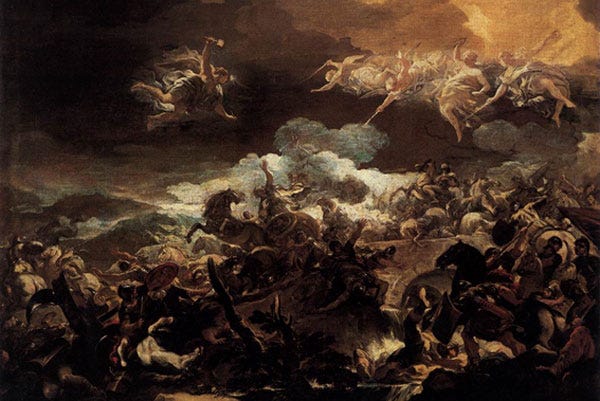Featured Article - Identifying an Ancient Battle and Dating the Song of Deborah
Issue 29
Author: Petros Koutoupis
Originally published at Ancient Origins (17 July, 2014) but revised.

In the world of academia, it has always been the general consensus that some of the Bible’s poetry predates its prose literature. For instance, the poetry came first, whether it was preserved orally or otherwise and eventually the prose stories were built around it. The same theory has been applied to the Song of Deborah (i.e. Judges 5) which scholars date to ca. 1100 BCE. It is generally accepted that this poem preserves an Israelite battle against the Shardana (sometimes referred to as the Sherden), a war like group of Sea Peoples that occupied the area of the Levant from around the 14th century BCE and later. This connection was made when scholars studying some of the archives found at Ugarit, located to the North of the battleground at modern day Ras Shamra, discovered the name of a prince of a nearby Shardana colony dating to the 14th century BCE. His name was Zi-za-ru-wa or Si-sa-ru-wa; that is, Sisera. The very same name found in the poem of Judges 5, however, it should not be assumed that this is the same Sisera. The name could and would have been a common one.
The kings came and fought,
Then the kings of Canaan fought
In Taanach, by the waters of Megiddo;
They took no spoils of silver.
They fought from the heavens;
The stars from their courses fought against Sisera.
The torrent of Kishon swept them away,
That ancient torrent, the torrent of Kishon.
[From Judges 5 – Song of Deborah ]
Shifting back to the poem, it tells of a battle that occurred between Megiddo and Taanach. Archaeological Professor Adam Zertal had found evidence of a Shardana settlement just south of this location at el-Ahwat (Arabic for “the Walls”). This settlement dates to 1220-1170 BCE. After 1170 BCE, it had not been occupied since.

As mentioned earlier, the Shardana have been in and around the Levant for centuries and are also fairly well documented across multiple sources. While their exact origins are unknown, they are believed to have come from the general Aegean region. We see evidence of their occupation in the general Near East as early as the Amarna Letters (EA 81, EA 122, and EA 123) dating to the 14th century BCE. Here they served as part of an Egyptian garrison in Byblos, where they provided their services to the mayor, Rib Hadda. They served as personal guards for Ramesses II and fought alongside the Pharaoh in his most memorable battle against the Hittites at Qadesh in 1274 BCE. The inscriptions of Merneptah and Ramesses III, pit the Shardana against the Pharaohs as part of a coalition of seafarers invading Egypt. At approximately 1100 BCE, the Onomasticon of Amenemope, lists them as occupying the Phoenician coast. In almost every documented source, the Shardana were commonly depicted as hired mercenaries.
Did the Song of Deborah mark the defeat of the Shardana, led by Sisera and either force them to evacuate el-Ahwat or disappear completely from the region? If this did mark the defeat of the Shardana from el-Ahwat, then can we date this poem to 1170 BCE? The orthographical (i.e. spelling) studies of Frank Moore Cross and David Noel Freedman to even the research of William Foxwell Albright place the style of poetry to no later than 1100 BCE and with a date of 1170 BCE for the actual battle, it would seem like a probable date of composition.
Sources
Cross, Frank M., and David N. Freedman. Early Hebrew Orthography . Vol. 36. New Haven: American Oriental Society, 1952. [Print]
Cross, Frank M., and David N. Freedman. Studies in Ancient Yahwistic Poetry . 2nd ed. Grand Rapids/Cambridge/Livonia: Wm, B. Eerdmans Co. / Dove Booksellers, 1997. [Print]
JPS Hebrew-English Tanakh . Philadelphia: Jewish Publication Society, 2003. [Print]
Healy, Mark. Qadesh 1300 BC: Clash of the warrior kings . New York: Osprey P, 1993. [Print]
Zertal, Adam. “Philistine Kin Found in Early Israel.” Biblical Archaeology Review, May/Jun 2002, 18+. [Print]
The Encyclopedia of El Amarna Research Tool [Online]
Available at: http://www.specialtyinterests.net/eae.html (archive.org: https://web.archive.org/web/20140330091509/http://www.specialtyinterests.net/eae.html), [Accessed 14 July 2014].


